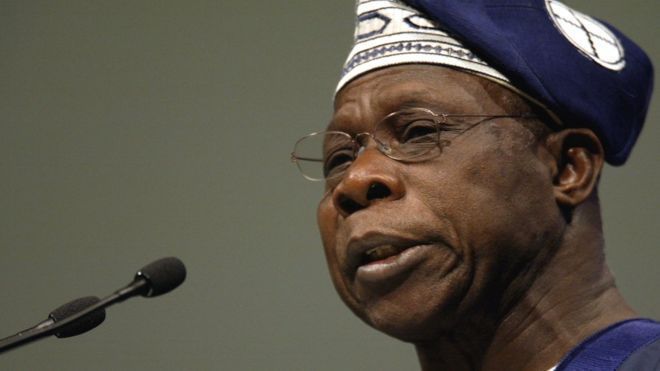Former president of Nigeria, Chief Olusegun Obasanjo, on Monday said the African Continental Free Trade Agreement (AfCFTA) Agreement will not be hindered by Nigeria’s reluctance to sign up to the process.
Obasanjo made the remark in Addis Ababa, Ethiopia, during the opening session of the Stakeholders’ Dialogue on Continental Trade and Strengthening the Implementation of the AfCFTA.
The dialogue was organised by the African Union Commission (AUC) and the Coalition for Dialogue on Africa (CoDA).
The former President was reacting to concerns raised by one of the discussants at the event, on the need for stakeholders to look into the implications of AfCFTA without Nigeria, the continent’s biggest economy.
The News Agency of Nigeria reports that Nigeria, Benin and Eritrea are the only countries yet to sign the AfCFTA agreement.
Obasanjo, who recalled that Nigeria took over the processes leading to the AfCFTA agreement from Egypt, wondered why it suddenly halted signing and was not even participating at the session.
He also recalled that Nigeria led the way at ministerial level, with the government ready to be in Kigali, Rwanda, to sign up to the agreement, before the sudden turnabout.
According to him, Nigeria should resolve its domestic intrigues and not bring such to the African Union table.
“It is nobody’s fault if your country cannot resolve its domestic problem.
“If you (Nigeria) is not signing the agreement, it is unfortunate. AfCFTA will go on without Nigeria.
“You will recall that this is the first time, since 1976, that Nigeria is not at the table of a major continental process.
“Nigeria should settle its problem at home and not bring it to the AU,’’ Obasanjo said.
The former President said Nigeria is known to always be on the driver’s seat of continental discussions and agreements, including the AU, ECOWAS and all their agencies.
Obasanjo, who is the chair of the CoDA Board of Directors, said feelers from the AfCFTA remain positive, while teething problems would be addressed in the course of time.
He said the meetings would be extended to other stakeholders, including Africa’s Central Banks, Customs and security agencies.
Obasanjo added that removal of trade barriers does not mean removal of other statutory agencies at various national border posts.
He, however, commended the issuance of visas at the point of entry by some African countries, saying the gesture was a positive step in the right direction toward movement of people across the continent.
The African Continental Free Trade Agreement (AfCFTA) is a trade agreement between 49 African Union member states, with the goal of creating a single market followed by free movement and a single-currency union.
The AfCFTA was signed in Kigali, Rwanda on 21 March 2018. Ratification by 22 countries is required for the agreement to enter into force and the African Continental Free Trade Area to become effective. The agreement will function as an umbrella to which protocols and annexes will be added.
Negotiations continued in 2018 with Phase II, including Competition Policy, Investment and Intellectual Property Rights. A draft shall be submitted for the January 2020 AU Assembly.
Kenya and Ghana were the first countries to deposit the ratification instruments on 10 May 2018 after ratification through their parliaments.
With ratification by the Gambia on 2 April 2019, the threshold of 22 ratifying states for the free trade area to formally exist was reached, though as of 30 April 2019 all the ratifying states submitted their ratification documents to the African Union.
Nigeria has yet to sign the agreement. At over 173 million people, Nigeria is Africa’s most populous country and dwarfs the second most-populous country, Ethiopia, with 100 million people. With a nominal GDP of $376 billion, or around 17% of Africa’s GDP, it is just ahead of South Africa, which makes up the next 16% of Africa’s economy.
Because Nigeria is such a significant country in Africa in terms of its population and its economy, its absence since the initial signing of the agreement until now is particularly conspicuous.
South African President Cyril Ramaphosa underscored this in comments on 12 July 2018, saying “The continent is waiting for Nigeria and South Africa. By trading among ourselves, we are able to retain more resources in the continent’’(South Africa has since signed the agreement).
Some 44 countries initially signed the agreement in 21 March 2018. Nigeria was one of 11 African Union nations to avoid initially signing. At the time, Nigerian President Muhammadu Buhari said that Nigeria couldn’t do anything that would undermine local manufacturers and entrepreneurs.
The Manufacturers’ Association of Nigeria, which represents 3000 Nigerian manufacturers, praised the decision to back out of the agreement. The Nigerian foreign minister tweeted that more domestic consultation that was needed before Nigeria could sign the agreement.
Former president Olusegun Obasanjo said Nigeria’s delay was regrettable. The Nigeria Labour Congress called the agreement a “renewed, extremely dangerous and radioactive neo-liberal policy initiative’’, suggesting increased economic pressure would pressure workers into migration under difficult and unsafe conditions.

 News6 years ago
News6 years ago
 Featured6 years ago
Featured6 years ago
 Boss Picks6 years ago
Boss Picks6 years ago
 Headline6 years ago
Headline6 years ago
 Headline6 years ago
Headline6 years ago
 Headline5 years ago
Headline5 years ago
 Headline6 years ago
Headline6 years ago
 Headline6 years ago
Headline6 years ago












